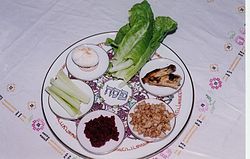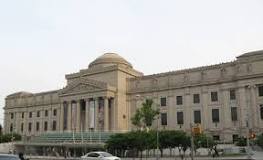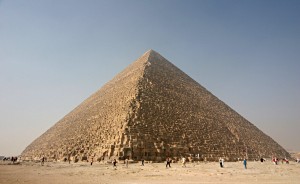
I consider myself a Jewish rationalist, someone who identifies culturally with Judaism without buying the biblical myths. The Exodus story of the plagues and the parting of the Red Sea, told every Passover? Just one of the many overwrought episodes in the Old Testament, akin to the stories of Noah’s ark and Jonah’s stint inside a whale (strange, given the desert locale, how many of them involve scary water).

When I was old enough, I questioned the symbolism of the items on the seder plate. My favorite food was charosets, a mix of chopped apples, walnuts, and grape juice meant to represent the mortar used by the Jews exiled in Egypt to build the pyramids. Why make the building materials taste so good, I wondered, if you want to show how awful the job is?
But until a few days ago, I never questioned the underlying premise of the Passover story: that the Jews were slaves in Egypt.
Early Pharaoh Lust
First — a guilty secret. I’ve always had a thing for Egypt. At family seders, I would dutifully recite the story of the Israelites’ abuse by the Pharaohs, while harboring a secret love for the land of the oppressors. “Let my people go,” I would sing, while longing to visit the Nile kingdom.
I partly blame Cecil B. DeMille, who cast sexy Yul Brynner as Ramses II against Charlton Heston’s buff-but-boring Moses in the “Ten Commandments.” My childhood friend Sharon and I would cross our arms and mimic the bald hunk intoning, “So let it be written. So let it be done.”

But my Egypt-o-philia went deeper than a childhood movie crush. Every few weeks, before I was old enough to go on my own, my mother would walk with me from our apartment on Lincoln Road down Washington Avenue to Grand Army Plaza and the Brooklyn Museum. I came to adore the hushed, high-ceiling halls of the Egyptian exhibits. I don’t doubt that the serenity of the setting, the quiet shared time with my mother, were part of the appeal. But there was something about the art itself that spoke to me on a primal level. I loved the busts with the elegant headdresses and exotic names like Akhenaten and Nefertiti, the clean lines of the towering statues, powerful beings who transcended the messiness of everyday life. Even my fear of the mummies couldn’t put a damper on my Egypt lust.
Happily, I grew up to be a travel writer and wangled an assignment to update a guidebook to Egypt in the late 1980s. It wasn’t the serene land of my imagination, of course, but in some ways it was better, vibrant with the complex energy and languor of the Middle East, including Israel. When I saw the great pyramid of Giza, I felt a little bad about my ancestors having had to labor over it and all, but it didn’t dampen my admiration.
Blame Herodotus — maybe
I don’t hanker after Egypt itself anymore, given its current chaos and hostility to Westerners, but I still love the country’s ancient art. So on my recent trip to New York, I visited the Brooklyn Museum as well as the Metropolitan’s Egyptian collection (with the aforementioned fellow Yul Brenner-admirer of my youth).
As I sat down a few days ago to continue chronicling my New York visit, planning to confess my guilty love for Egypt in time for Passover, I decided to dig deeper.
It took less than a minute for me to find an article on Skeptoid.com, Did Jewish Slaves Build the Pyramids? by Brian Dunning.
It’s a complex, well-researched piece that distinguishes between Jews, Israelites and Hebrews; details the construction of the pyramids; and outlines the history of the presence in Egypt of any peoples who might later have been lumped into the category of “Jews.”
The key conclusions:
- The pyramids were not built by slaves but, rather, by poor Egyptian workers who were well compensated for their labors.
- The Jews were not in Egypt at the time of the building of the Great Pyramid of Giza; neither was Ramses II, the pharaoh played by Yul Brynner.
- Jews did turn up in Egypt, at Elephantine, but at a later date, and they were not slaves. Rather, they fought alongside the Egyptians.

So where did the Jewish-slaves-built-the-pyramids story come from? It’s still not clear. Dunning cites a source that says “Herodotus reported in his Book II of The Histories that the pyramids were built in 30 years by 100,000 Jewish slaves,” but then adds:
In point of fact, Herodotus only says 100,000 workers. He does not mention either Jews or slaves. So even this popular belief seems to be in error, and the origin of the idea of Jews building the pyramids remains a mystery. Coincidentally, the text of the Book of Exodus was finalized at just about exactly the same time as Herodotus wrote The Histories. Obviously, the same information about what had been going on in Egypt 2,000 years before was available to both authors.
Menachim Begin, Embarrassment, and the Ultimate Meaning of Passover
Reading this sent me into an emotional tailspin.
First, I felt like an idiot. I’m not a bible literalist. How did I never question the core of the Passover story?
Then I felt relieved that I was in good company. According to Dunning:
In 1977, Israeli prime minister Menachem Begin visited Egypt’s National Museum in Cairo and stated ‘We built the pyramids.’ Perhaps to the surprise of a lot of people, this sparked outrage throughout the Egyptian people, proud that they had built the pyramids. The belief that Jews built the pyramids may be prominent throughout Christian and Jewish populations, but it’s certainly not the way anyone in Egypt remembers things.
It could have been worse. At least I didn’t embarrass myself on the world stage and almost start an international incident.
Then I felt guilty (well, maybe I was guilty from the beginning, the default Jewish emotion). I considered not posting this piece because it seemed disrespectful. It’s one thing to write about my childish skepticism regarding certain aspects of the Passover story; it’s another to debunk the center of a holiday that people are celebrating.
Then I got paranoid.
What if it this post stirs up anti-semitism, I wondered, if some nut takes this misinterpretation of history as fodder for hatred against the Jews? Holocaust deniers and their ilk use every little fact they find to prove their case.
A Tradition of Questioning
Finally, I came to my senses.
For one thing, it’s not just Jews who believe the story, but also Christians, who often cite the Old Testament to justify… well, a bunch of weird stuff. Cecil B. DeMille, the director of “The Ten Commandments,” wasn’t Jewish.
More important, we Jews are not responsible for our persecution. Anti-semitism is irrational. Haters are gonna hate and Holocaust deniers are going to grab at crazy straws to make their crazy case, no matter the facts.
One of the key seder rituals is the Ma Nishtanah, the asking of the Four Questions by the youngest child in the room as soon as he or she is able to read or memorize them (my first-born sister may have had more pictures taken of her as a child, but I had this advantage once a year). The value of questioning, of intellectual inquiry from the earliest age, is central to Judaism. And the best of us, like the best of the rest of the world’s citizens, go with the conclusions to which the facts lead us, even if they are not what we wanted to hear when we set out.
It’s a tradition by which I try to live, and one perfectly in keeping with the spirit of Passover.

One of the things I love best about Judaism is the tradition of questioning. I appreciate the personal & factual angles of this piece & especially your observation that antisemitism is not the fault of the Jews, so it’s not necessary to be so cautious. Thank you for an interesting explore.
Thank you, Anna. This piece took me even longer than usual to write because of my fear about how it might be misconstrued — until, as I said, I came to my senses. The writing process, as you know, can be torture, but it’s also a wonderful learning tool if we allow ourselves to go where it takes us.
Nice piece! And I learned something. I had heard somewhere that the pyramids were built by paid laborers, but hadn’t put it together w the Passover story (or deMille).
Thanks, Renee. Considering that I updated a guidebook to Egypt and loved Egyptian art all these years, my inability to put all the pieces together is a bit disconcerting…
I never felt comfortable at my parents (really grandparents) seder. I would squirm in my chair then go to the bathroom and read the book that I hid earlier in the day. I remember arguing w my mother – Moses didn’t part the Red Sea – it was low tide. She told me I should never question my religion – so much for encouraging intellectual inquiry.
Today, I prepare some of the traditional foods because I love to eat charosets, chopped liver, chocolate covered matzo (once a year) shared with good friends over a bottle of wine.
Wish I could come to your seder, Marilyn! The food sounds wonderful. Intellectual inquiry about Judaism wasn’t exactly encouraged in my house either, but our families did put an emphasis on getting a good education.
Yes, Edie. I had a teacher who talked about writing your way there, which I find useful time & again.
I have a two friends who are completing Ph.D’s in Biblical Studies, and I’d be interested in their take on this. The book of Exodus does not mention the pyramids, but rather the “store cities of Pithom and Ramses.” The Ramses mentioned has no numeral. As we all know, pyramids are crypts, not store cities. So maybe we’re all right. 🙂
I’ll be very interested in hearing what your friends say, but pyramids or no, there’s no getting around the basic issue: That the Jews/Hebrews/Israelites weren’t enslaved. The author of the debunking piece also points out that the Jews weren’t around in the time of the other Ramses either.
Hi there! Catching up on reading your blog on a Sunday morning….And now your insights and research will stay with me forever just as the traditions of Passover have….I have wonderful memories of Seders at my house with relatives …my Mom made great Seders and my father always led them….this year it was at Gail’s house… A” condensed” Haggadah shortened even more by us… But with all the traditional foods and of course family (the ones who weren’t working that is )….
Thanks for the memories!
Sha
Thanks for sharing yours — and helping to make mine.
Very interesting. The bible is part fact part fiction. The problem is we don’t know which is which. Every day we now have fake news. Most believe it is a new occurrence but i’me sure it started at the same time as Genesis. You have summed it up nicely, just wish I could tell you the real facts. For example I am sure you don’t even know why you are called an Ashkenazi Jew.
Leonard
Thanks, Leonard. I know now why I am called an Ashkenazi Jew because you told me at our lovely family reunion in London!
Thanks for explaining. You explained everything so well. Beware of misinformation, guys. Keep posting!